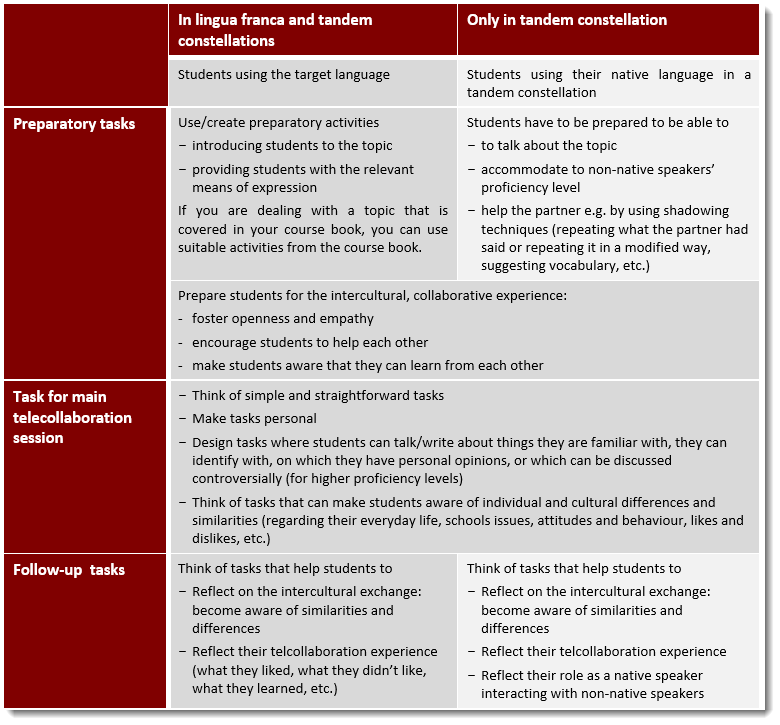General
TILA - Task Development
TILA telecollaboration tasks
Languages are used in face-to-face situations but nowadays they are also used in computer-and-mobile-device mediated communication. So, it seems reasonable that the use of the foreign language should be promoted in these two contexts.
The TILA project is based on the use of telecollaboration (TC) and we believe the best way is through a task-based approach. This in turn means that teacher and student in TC need to change – although many of the more modern approaches to the teaching of languages have already been implemented in non-virtual classrooms.
Autonomous learning is promoted by having the pupils carry out tasks and solve problems in pairs or small groups. For us it is essential to promote negotiation of meaning through participation and to enhance participation and dialogue between pupils who are geographically distant.
Tasks in TILA are divided into three phases. The pre-task phase involves explaining to one’s own pupils what they have to do and, if needed, supplying them with the vocabulary and structures they will be using. In the main phase, pupils carry out the tasks using video conferencing, virtual words, chats, etc. In the post-task phase the teacher gets and offers feedback.
The preparatory phase activates background knowledge and prepares pupils to make predictions. Those are the two basic aims of any preparatory phase in a good lesson plan and that way we help pupils to promote schemata which is an essential part of the comprehension process. At the same time, by reviewing some of the vocabulary and grammar sturctures that pupils will be using in the main phase, we are also anticipating possible problems and we are preparing learners for the actual telecollaboration session.
During the main task phase, which is when pupils actually carry out the telecollaborative activity, pupils play the main role and the teacher is a mere facilitator. This part of the task promotes autonomous learning and collaborative work.
Finally, the aim of the post-task phase is to provide pupils with feedback (on their possible linguistic, communicative and intercultural problems), but also to receive feedback from them. We are interested in finding out what things they found more interesting, what they liked least, their appreciation of the level of difficulty, their view on intercultural aspects and so on. We can use this part of the lesson as an expansion activity. We can work with the whole class by asking the pupils that took part in the exchange to report to the other members of the class or by getting them to carry out other types of activities related to the topic used in the task that involve the whole group of pupils (for instance, a writing task, a speaking activity, a reading lesson, etc.). That way, apart from consolidating what they have learnt in the two previous phases, we will also be able to raise awareness of some important intercultural aspects.



